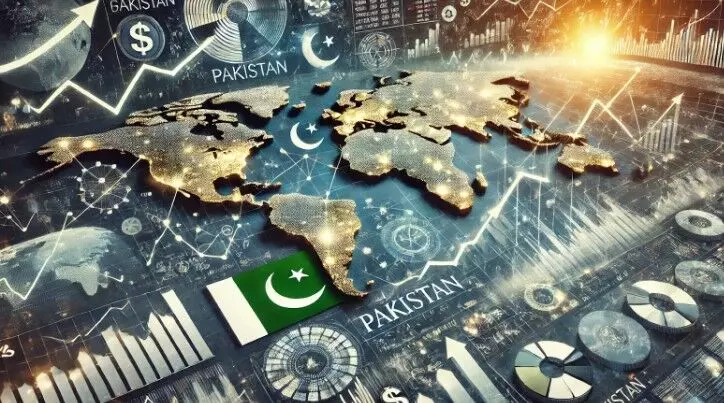Global Economic Trends and What They Mean for Pakistan

In today’s interconnected world, the global economy influences nearly every nation, and Pakistan is no exception. Understanding global economic trends is essential for Pakistan to navigate the complexities of international markets and leverage opportunities for growth. This article delves into the major global economic trends and explores what they mean for Pakistan’s future.
Major Global Economic Trends
The global economy is undergoing rapid changes, marked by several key trends that are shaping the world. One such trend is the shift in global trade dynamics, characterized by the rise of protectionism in many developed countries. Policies favoring domestic industries and restricting imports are altering the flow of international trade, affecting developing economies like Pakistan that depend heavily on exports.
Another significant trend is the ongoing wave of technological advancements. The digital revolution and increased automation are transforming industries around the globe, bringing opportunities for innovation as well as challenges for workforce adaptation. Countries that can effectively embrace technology are likely to reap significant economic rewards.
Climate change and sustainability initiatives are also reshaping the global economy. With a growing emphasis on reducing carbon emissions and promoting green energy, countries worldwide are pivoting towards more sustainable economic practices. This trend offers both challenges and opportunities for Pakistan as it seeks to balance development with environmental sustainability.
Impact on Pakistan's Economy
Global trade dynamics have a direct impact on Pakistan’s economy, particularly on its exports. As major trading partners shift towards more protectionist policies, Pakistan must adapt by diversifying its export base and finding new markets. Additionally, disruptions in the global supply chain can have knock-on effects on Pakistan’s manufacturing sector, impacting everything from textiles to agriculture.
Investment flows are another critical area influenced by global trends. Foreign direct investment (FDI) plays a key role in Pakistan’s economic growth, and global economic uncertainty or slowdowns in major economies can impact the flow of capital into the country. Maintaining a favorable investment climate is crucial for Pakistan to attract foreign investors amidst fluctuating global conditions.
Technological advancements present both opportunities and challenges. Embracing innovations like automation and digitalization can help Pakistan boost productivity and remain competitive. However, adapting to these changes requires significant investment in education and workforce training to ensure that the population is equipped with the skills necessary for the evolving job market.
Opportunities Arising from Global Trends
Despite the challenges, several opportunities arise from these global trends. One such opportunity is the potential for integration with global supply chains. As global trade patterns evolve, Pakistan can position itself as a key player in certain industries, especially in textiles and agriculture, by improving its infrastructure and regulatory environment.
Another promising area is tech-driven growth. The global shift towards a digital economy opens up new avenues for Pakistan to foster innovation, promote entrepreneurship, and expand its services sector. Encouraging the growth of tech startups and investing in IT education can help Pakistan capitalize on this trend.
The global focus on a green economy also offers opportunities for Pakistan. By investing in renewable energy and promoting sustainable practices, Pakistan can reduce its carbon footprint and align itself with the global push towards sustainability. This transition can also attract environmentally conscious investors and open up new markets for green products.
Challenges for Pakistan
However, navigating these opportunities is not without challenges. One major challenge is exposure to global financial volatility. Economic slowdowns in key markets can have ripple effects on Pakistan, affecting export revenues and FDI inflows. Diversifying export markets and building economic resilience are critical steps for mitigating these risks.
Pakistan’s dependence on key trading partners also makes it vulnerable to changes in global trade policies. Expanding trade relations with a broader range of countries can help reduce this vulnerability and ensure more stable economic growth.
Additionally, adapting to technological changes remains a challenge. The shift towards automation and digitalization requires a workforce that is skilled in new technologies. Pakistan must invest in education and skill development programs to prepare its population for the demands of a rapidly changing job market.
Policy Recommendations
To navigate these global economic trends effectively, Pakistan must take proactive steps. Diversifying exports and reducing dependence on a limited number of markets will help mitigate the impact of global trade disruptions. Fostering innovation through investments in education and skill development is crucial for ensuring that Pakistan remains competitive in an increasingly technology-driven world.
Promoting green initiatives is another important area. By aligning with global sustainability trends, Pakistan can open up new opportunities for economic growth while contributing to the fight against climate change.
Conclusion
Global economic trends have significant implications for Pakistan's future. From shifts in trade dynamics to technological advancements and sustainability initiatives, the world is changing rapidly. By understanding these trends and taking proactive measures, Pakistan can harness the opportunities they present while mitigating the risks.
With the world economy in constant flux, staying informed is key to navigating these shifts. For more insights into how global trends are shaping Pakistan’s economic landscape, Pakeconet provides comprehensive news and expert analysis, making it a valuable resource for policymakers, business leaders, and investors alike.













